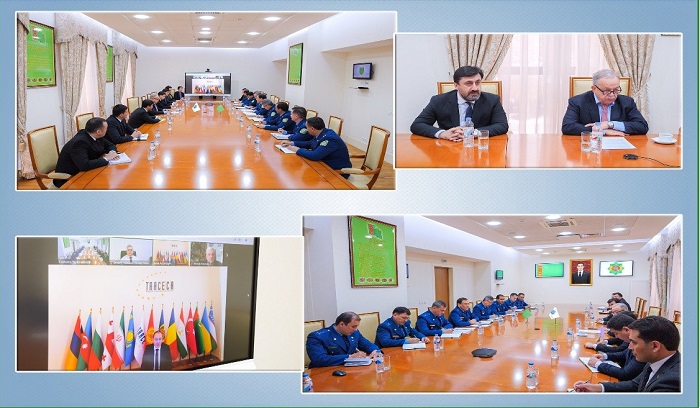On 26 February 2024, the Central Office of the State Customs Service of Turkmenistan hosted a roundtable discussion focused on implementing the World Customs Organization’s (WCO) “Guidelines on Mutual Recognition of AEOs” in the region of Central Asia and the South Caucasus.
This event coincided with the visit of Igor Runov, Executive Secretary of the UN Center for Transport Diplomacy. Round table organized via video-conference, brought together WCO experts, representatives from the UN Group of Friends on Sustainable Transport, the TRACECA (Europe-Caucasus-Asia) secretariat, and the customs authorities of Central Asian countries, Azerbaijan, and Georgia.
Turkmenistan was represented by officials from the Ministry of Foreign Affairs, the State Customs Service, and the Agency for Transport and Communications.
Discussions centered around:
• Implementing core principles of the WCO SAFE Framework of Standards to secure and facilitate global trade in the region, considering best practices from other areas.
• Evaluating existing regional agreements for AEO mutual recognition, including examples from South Africa, the Middle East, EU.
• Insights from the Moldavian Customs Service on implementing the AEO system.
• The concept of creating a regional agreement for AEO mutual recognition in Eurasia.
In Turkmenistan, the norm on the authorized economic operator was incorporated into the customs legislation in October 2023. An Authorized Economic Operator (AEO) is defined by the WCO SAFE Framework of Standards as a party involved in the international movement of goods, in whatever function, that has been approved by, or on behalf of, a national Customs administration as complying with WCO or equivalent supply chain security standards. AEOs include inter alia manufacturers, importers, exporters, brokers, carriers, consolidators, intermediaries, ports, airports, terminal operators, integrated operators, warehouses and distributors. ///nCa, 28 February 2024
